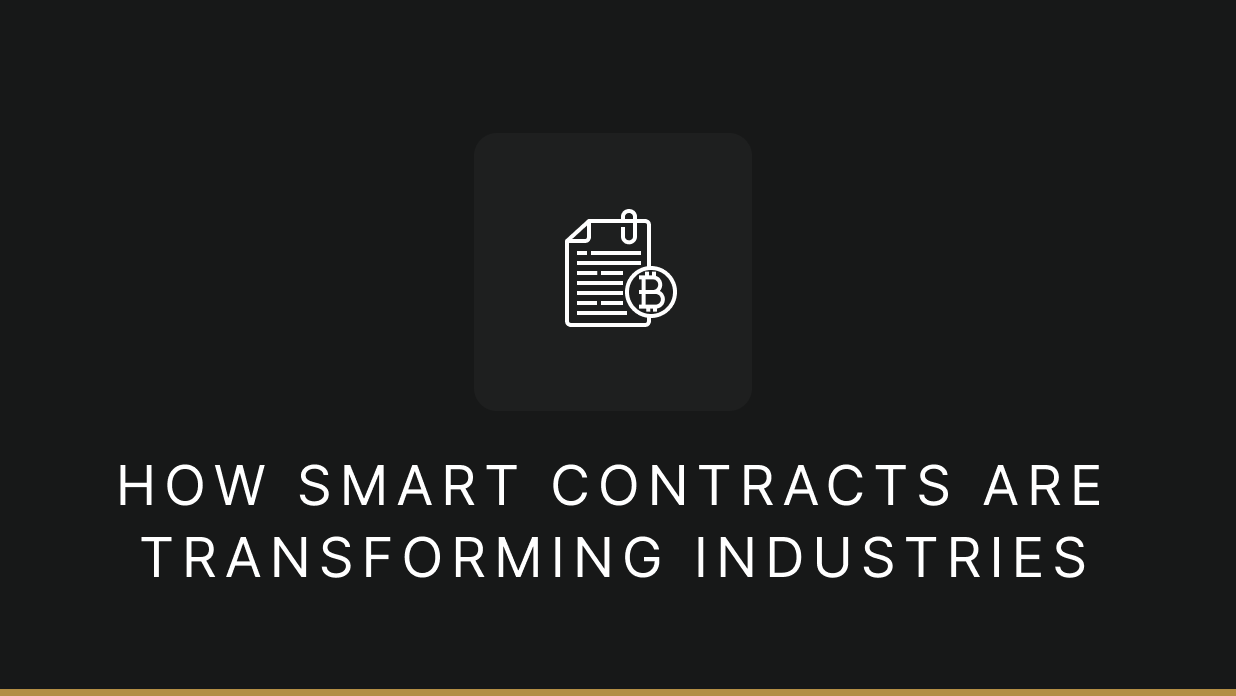Whilst they are perhaps best known for their application in the real estate sector, smart contracts are transforming industries all over the world. From healthcare to financial services, smart contracts are improving data storage and management, and automating traditionally time-consuming tasks that can now be handled and executed by decentralized systems. In this article, we take a closer look at how smart contracts are transforming industries and which industries are benefiting most from this emerging technology.
What are smart contracts?
Smart contracts are self-executing agreements embedded in lines of code, which automatically execute and enforce their terms when specific conditions are met. Smart contracts are set up and function on blockchain technology, meaning that, just like cryptocurrency transactions, they are immutable and cannot be tampered with once deployed. Their decentralized nature means that these contracts can be signed and executed without the need for intermediaries or a central authority, which makes sound contracts, agreements, and transactions possible between anonymous parties.
Among their many advantages, smart contracts offer greater flexibility, automation, transparency, cost savings, and security; however, as with any technology, they still come with some risks. While immutability can be a significant benefit for many, this permanent fixture relies on correct programming by a human programmer, introducing an element of risk and making them impossible to alter if mistakes are found.
That being said, overall, smart contracts represent a significant step forward in contract management, execution, and efficiency, once again thanks to blockchain technology.
Which industries are benefiting from smart contracts?
Some of the largest and most powerful industries in the world are already benefiting from the capabilities of smart contracts, namely enhanced efficiency, security, accuracy, and cost reduction. Below are some of their most successful areas of application thus far. As technology continues to develop and mainstream sectors become more comfortable adopting these emerging trends, the coming decade could see a complete transformation of how both professionals and clients within these industries perceive and interact with essential services.
Healthcare: Transforming patient data management
Smart contracts are being implemented in the healthcare industry to enhance how patient data is stored and managed. In this case, smart contracts help medical professionals gain faster access to patient information, which in turn can have huge benefits on the patient’s treatment and prognosis. Smart contracts also enhance security and efficiency by facilitating compliance with regulations. The healthcare industry can increase security around a patient’s personal information and medical history by implementing decentralized identifiers and digital signatures, thus increasing patient confidentiality.
Retail and e-commerce
Smart contracts are transforming the retail and e-commerce sector by automating the buying and selling process, which reduces reliance on intermediaries, as well as transaction costs. They also enable secure and transparent payments and streamline the payment process, helping to create a more positive shopping experience. Smart contracts can also improve efficiency for retail operations by automating administrative tasks and ensuring accountability in supply chains, allowing companies to reallocate resources and save money.
Financial services
Smart contracts are being increasingly implemented in the financial services sector to increase efficiency, accuracy, and automation. Time-consuming tasks that traditionally required human intervention can now be streamlined by implementing smart contracts. This automation will make operations more cost-effective, reduce the risk of error and fraud, enhance data security, and help obtain faster approvals. Overall, smart contracts can make financial operations and services faster and more secure, benefiting parties on both sides of the transaction.
Smart contracts for real estate
Smart contracts are the latest disruptive technology to impact the real estate sector. As seen in the examples above, smart contracts are transforming industries in every realm of life and business, but real estate is perhaps where their benefits are best known. The bundle of blockchain technology, cryptocurrency, and smart contracts has made it possible for peer-to-peer real estate sales and complex processes such as transactions, title verification, and rental agreements, smart contracts to be undertaken without any input from traditional intermediaries such as banks, real estate agents or title companies.
In the real estate sector, smart contracts also enable fractional ownership of a single property, which allows investors to purchase a digital token representing a fraction of the building, house, or apartment for a cheaper price, while still benefiting from the appreciation of this asset over time. This innovation is changing the way people invest in real estate and lowering the entry barriers, particularly for overseas investors looking to buy property in otherwise unfeasible cities such as New York or London. Smart contracts can also be used for mortgages, automatically executing payments and registering property records on the blockchain for greater transparency, efficiency, and clarity.
For more on blockchain technology, crypto as a form of payment, and how, as a merchant or business, to accept crypto payments from your customers, visit www.forumpay.com, or get in touch with our sales team to discuss any questions you may have.



